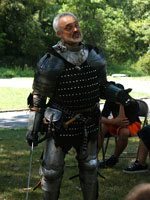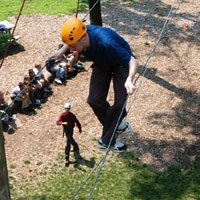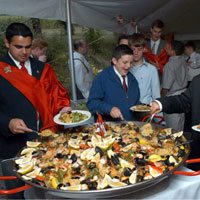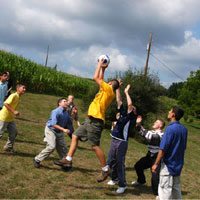
In Kenelm Henry Digby’s book, The Broad-Stone of Honor, the following definition of chivalry is offered: “Chivalry is only a name for that general spirit or state of mind which disposes men to heroic actions, and keeps them conversant with all that is beautiful and sublime in the intellectual and moral world.”
But chivalry is also a code to live by, a discipline, and by presenting traditional masculine Catholic virtues as living principles, the Call to Chivalry camp, held in rural Pennsylvania at the Saint Louis de Montfort Academy between August 9-19, formed a group of young men into the mold of crusader knights; they were challenged to action and taught by the example of past saint crusaders.
Mornings start early at the tolling of a large, authoritative bell. Beds are made to exact standards. Teeth are brushed. Faces are washed. And at the ringing of the next bell all of the participants, aged 13-18, are standing at attention outside their rooms. Mr. Cesar Franco, the camp coordinator for the TFP, paces the halls and asks, “Has anyone not brushed their teeth?” A few hands rise as an example of honesty to the others. “Ten push-ups!” The push-ups are dutifully done and the room inspections completed.
 Learn All About the Prophecies of Our Lady of Good Success About Our Times
Learn All About the Prophecies of Our Lady of Good Success About Our Times
Rooms not up to par are corrected according to the specific standards learned quickly on the first morning of camp. From here, at the ringing of the next bell, the boys — young gentlemen-in-training — line up smartly dressed in formation for the raising of the TFP’s red banner and chant the Nicene Creed in the Gregorian fashion. Breakfast is then served by camp participants at a properly set table where good table manners are used. The Rosary is said immediately following breakfast.

The theme of this year’s Call to Chivalry camp was “Don Pelayo and the Reconquest of Spain.” Stories of battles and saints were recounted as models for heroic defense of the faith accompanied by visual presentations highlighting these events as depicted in art, architecture and photography. The program creates an environment where boys learn how to be Catholic gentlemen. As one participant noted, “There is no doubt what kind of environment this is…It’s Catholic.” An activity is stopped for the Angelus at its appointed hour, for example.
There was a healthy mixture of sport and leisure. Participants went to nearby Roundtop Mountain for low and high ropes courses consisting of challenging tasks and problems that helped groups to focus on communication, trust, and cooperation. Teams were built and leaders emerged. There was a rock climbing wall, wire rope bridges, and other obstacles navigable only with the help of licensed instructors and other team members who controlled the safety ropes. Such activities were a tremendous confidence booster.

The Ten Commandments of Chivalry
Games of medieval origin were played like French football and shield ball. Classes in medieval swordsmanship and armor were taught by fencing instructor Mr. Roark Mitzell. Paintball, although less medieval, fostered competition and near-battlefield heroism. All of these activities prepared the participants to take their faith into the world, and confidently battle the forces of evil in their daily lives.
The feast of the Assumption of the Blessed Virgin Mary occurred at the midpoint of the camp. This was no ordinary day. There was great celebration in the air with a grand dinner. The extraordinariness of the day was marked not only with holy Mass, but also with a great culinary feast. A traditional Spanish dish called paella, normally served on Sundays and great feast days, was cooked in a 40-inch paella pan over an outdoor fire and served to much fanfare. This first-class feast of the liturgical year became a social reality and a great convivium ensued.

The certainty of the program each day, where the hours passed with the tolling of a bell calling young men to action, structured their environment like a medieval cathedral school. This educational process, the product of organically developed Catholic culture, oriented the bodies, intellects, and souls toward Christ and service to Our Lady.
Traditions forgotten by the post-modern world — traditions foundational to our culture — were all harnessed to create an experience where young men were free to express their faith without pressures emanating from the prevailing television culture that surrounds us daily. Absent was the mundane; ever present was the divine. Catholic order was established and each boy quickly was able to find himself within this context.
